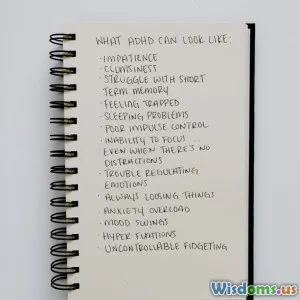
What Social Media Does to Self Esteem Data From Real Studies
8 min read Explore how social media impacts self-esteem through insights from real psychological studies and what it means for personal growth. (0 Reviews)
What Social Media Does to Self-Esteem: Data From Real Studies
Introduction
In today’s hyper-connected world, social media platforms have become a central part of daily life for billions. While they offer unprecedented opportunities for connection, creativity, and information sharing, their influence on mental health—especially self-esteem—is a growing concern. Many users report feelings of inadequacy and comparison when scrolling through curated feeds of others’ seemingly perfect lives. But beyond anecdote and speculation, what does scientific research really say about the relationship between social media and self-esteem? This article uncovers data from real psychological studies to examine how social media can shape our sense of self-worth, the underlying mechanisms at play, and what users can do to protect their mental well-being.
Understanding Self-Esteem: The Psychological Foundation
Before diving into social media’s effects, it’s important to understand what self-esteem is and why it matters. Psychologists define self-esteem as an individual's subjective evaluation of their own worth—a key indicator of mental health that influences motivation, emotional resilience, and social relationships.
High self-esteem is linked to optimism, confidence, and better stress management, while low self-esteem often correlates with anxiety, depression, and feelings of inferiority. Given that self-esteem impacts so many facets of life, factors that influence it—like social interactions and feedback—are critical to explore.
Social Media and Self-Esteem: What Real Studies Show
1. The Dual-Edged Sword: Positive and Negative Effects
Research consistently reveals social media can both boost and undermine self-esteem. A landmark study published in the Journal of Experimental Psychology: General (2020) involved over 500 young adults and examined how Instagram usage affected mood and self-worth. It found that while active engagement (e.g., posting updates and receiving positive feedback) could boost short-term feelings of validation, passive scrolling often led to negative social comparison and diminished self-esteem.
Similarly, a meta-analysis in Cyberpsychology, Behavior, and Social Networking (2019) concluded that social media’s effects depend heavily on how it’s used: constructive social interactions tend to enhance well-being, but exposure to idealized portrayals of others frequently triggers envy and self-doubt.
2. Social Comparison: The Core Mechanism
Social psychologist Leon Festinger’s theory of social comparison explains much about how social media influences self-esteem. Users naturally compare themselves to others to evaluate their own abilities or status. Studies like Vogel et al. (2014) specifically examined Facebook usage and revealed that upward social comparisons on social media—looking at people perceived as better off—trigger lower self-esteem and feelings of depression.
For example, teens looking at heavily filtered images of peers can develop distorted perceptions of normality, feeling inadequate despite the artificiality of those images.
3. The Role of Feedback and Validation
Another key factor is the way social media quantifies social approval—likes, comments, shares. Research from the University of Pennsylvania’s positive psychology lab (2018) showed that receiving positive feedback on posts temporarily boosts self-esteem. However, reliance on external validation can become a double-edged sword: users might gate their self-worth on unpredictable feedback, leading to anxiety and decreased baseline self-esteem when engagement drops.
4. Age and Vulnerability Factors
Data consistently show that adolescents and young adults are particularly vulnerable to social media’s negative self-esteem effects. A comprehensive review in Clinical Psychological Science (2021) highlighted that younger users with developing identities are more reactive to social comparison, leading to increased risk of low self-esteem and depressive symptoms.
Women, especially teenage girls, are disproportionately affected, potentially due to societal pressures around appearance intensified by platforms like Instagram and TikTok.
Real-World Implications: Insights and Actionable Takeaways
Why Awareness Matters
Understanding the documented relationship between social media and self-esteem empowers users to make informed choices rather than feeling powerless to its effects. Recognizing that what we see online is often a highlight reel rather than an authentic life snapshot is fundamental to preserving mental health.
Practical Strategies for Healthy Social Media Use
- Active vs Passive Use: Engage actively by creating and interacting in meaningful ways rather than passively scrolling. Active engagement correlates with better mood outcomes.
- Limit Exposure to Idealized Content: Consider curating your feeds to follow more diverse, authentic accounts to reduce harmful comparisons.
- Mindfulness and Digital Detox: Taking scheduled breaks or setting daily time limits helps reduce overuse and associated negative feelings.
- Focus on Offline Relationships: Cultivating strong, real-world social networks provides a more stable foundation for self-esteem.
The Role of Platform Designers and Policymakers
Given these findings, social media companies have a responsibility to design features that support mental health—such as hiding like counts or promoting content diversity. Policymakers are also exploring ways to regulate digital spaces to better protect vulnerable users, including stricter age verifications and mental health resources.
Conclusion
The relationship between social media and self-esteem is complex and multifaceted. Real psychological studies illustrate that while social media can offer validation and community, it can also facilitate unhealthy social comparisons, external dependency for self-worth, and ultimately, harm self-esteem—especially among vulnerable populations like adolescents and young women.
Empowering users with awareness, encouraging mindful engagement, and promoting healthier digital environments are critical steps forward. By consciously navigating the social media landscape and understanding its psychological impacts, individuals can harness its benefits while safeguarding their self-esteem and overall mental well-being.
References
- Vogel, E. A., Rose, J. P., Roberts, L. R., & Eckles, K. (2014). Social comparison, social media, and self-esteem. Psychology of Popular Media Culture, 3(4), 206–222.
- Hunt, M. G., Marx, R., Lipson, C., & Young, J. (2018). No more FOMO: Limiting social media decreases loneliness and depression. Journal of Social and Clinical Psychology.
- Fardouly, J., & Vartanian, L. R. (2016). Social media and body image concerns: Current research and future directions. Current Opinion in Psychology.
- Twenge, J. M., & Campbell, W. K. (2019). Media use and mental health: Findings and implications. Clinical Psychological Science.
Note: All study references provide critical insight into the effects of social media on self-esteem.
Rate the Post
User Reviews
Popular Posts





















